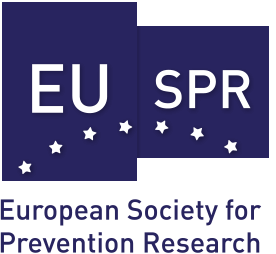We are running a number of pre-conference activities on 24/10/18 for Early Career Forum members.
These are free and include lunch for delegates attending the morning session or the whole day. You must be a member of our (free) ECF to participate (join here).
You can choose to attend a single session or both, but you must register in advance.
1. Promoting research – the do’s and don’ts of scientific communication
Facilitated by Dr Ilaria Montagni (University of Bordeaux, FR) with support by EUSPR Early Career Award winners Boris Chapoton (Centre Hygée, FR) and Dr Alexandra Morales (Miguel Hernández University, ES)
Date: October 24 2018
Time: 9:00 – 13:00
Location: EMCDDA main building
Synopsis:
Communicating research is crucial in order to have impact within the scientific community, among policymakers, practitioners and the public. This workshop will discuss successful strategies for the main channels of scientific communication: conventional communication (oral/poster presentation at a conference) and digital communication, such as social media, podcasts, videos, infographics, blogs. Based on this knowledge, participants will develop a narrative and a communication strategy for their own projects and receive feedback on their proposals from peers and senior researchers.
| Time | Activity |
| 9:00-9:05 | Introductory statements |
| 9:05:10:15 | Theory and practical examples of scientific communication: actors, messages, channels (Dr Ilaria Montagni) |
| 10:15-10:30 | Coffee break |
| 10:30-11:00 | Presentations by EUSPR Early Career Award winners (Boris Chapoton, Dr Alexandra Morales) |
| 11:00-11:30 | 11:00-11:30 Analysis and discussion of the EUSPR Early Career Awards winners’ presentations from the point of view of their scientific communication (facilitated by Dr Ilaria Montagni) |
| 11:30-12:30 | Group work
· Groups will work on participants’ projects to propose a communication plan identifying actors, messages and channels (participants are requested to send in advance a short description of their projects) · Each group will present their work |
| 12:30-13:00 | Roundtable with participants: Questions & Answers |
| 13:00 | Closing statements (Dr Ilaria Montagni) |
2. Early Career Researchers and Practitioners exchange forum
Prevention research meets prevention practice: can common goals improve both?
Facilitated by Dr Samuel Tomczyk (University of Greifswald, DE, and EUSPR-ECF lead) and Prof Rosaria Galanti (Karolinska Institutet, SW)
Date: October 24 2018
Time: 14:00 – 16:30
Location: City Hall
Synopsis:
The EUSPR exchange forum promotes an interactive workshop to tackle the question of how prevention research and prevention practice can inform each other and result in improvements on both levels.
Sometimes research and practice are perceived as separate processes, each with own rules and commitments when it comes to funding, work structure, target audiences and career and work prospects. In line with the conference theme of ‘Prevention Technologies – improving the use of evidence in prevention practice’, the proposed workshop aims to identify common goals for researchers (especially at the early career stage) and practitioners, by situating research and practice on a continuum beginning with relevant question and ending with the dissemination of a preventive program.
Through both group and plenary sessions early career researchers and practitioners will discuss together key concepts relevant to both science and practice at all stages of this continuum, among others; how to formulate a research question that is scientifically sound and relevant to practice; how to involve the target groups already at the stage of designing a research project.
| Time | Activity |
| 14:00 – 14:05 | Introductory statements |
| 14:05 – 14:45 | Opening dialogue:
Joint panel discussion of early career researchers and prevention practitioners regarding the implications and challenges of connecting research to prevention practice |
| 14:45 – 15:00 | Coffee break
|
| 15:00 – 15:45 | Group work
· Groups will be based on certain prevention topics depending on the audience’s interests, e.g. substance use, obesity, mental health · Identify 3-4 shared goals of practitioners and researchers research regarding the research process · Formulate a research question · Organise research (data collection etc.) · Implement prevention · Communicate and disseminate results |
| 15:45 – 16:30 | Synthesis of group work
· Presentation and discussion of group work (for each group and topic) · Extracting overarching themes (similarities and differences) · Discuss existing differences between both perspectives and address implications for future cooperation |
| 16:30 | Closing statements |
